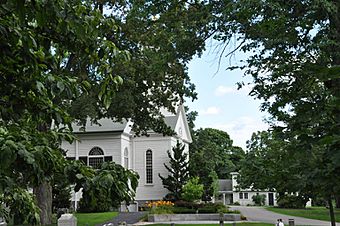Newton Lower Falls Historic District facts for kids
Quick facts for kids |
|
|
Newton Lower Falls Historic District
|
|

view on Concord Street
|
|
| Location | Roughly bounded by Hagar, Grove, Washington, and Concord Sts., Newton, Massachusetts |
|---|---|
| Architect | Jones, Vaughn |
| Architectural style | Greek Revival, Renaissance |
| MPS | Newton MRA |
| NRHP reference No. | 86001748 |
| Added to NRHP | September 04, 1986 |
The Newton Lower Falls Historic District is a special part of Newton, Massachusetts. It helps us imagine what life was like in colonial times. This historic area is found on the west side of Newton. It sits near Concord and Grove Streets, between Washington and Hagar Streets. This important district was added to the National Register of Historic Places in 1986.
Contents
Exploring Newton Lower Falls History
A Place of Early Power
The "lower falls" of the Charles River were very important. Even before colonial times, Native Americans used a path here. This path followed roughly where Washington Street is today. In the 1600s, English colonists started using the river's power. They built mills to grind grain (gristmills) and cut wood (sawmills).
People didn't start living permanently on the Newton side until the early 1700s. That's when an iron works factory was built here. The oldest house still standing is at 2345 Washington Street. It was built around 1755.
Growing the Village
The village grew on a hill above the river. St. Mary's Episcopal Church was built there around 1813. This church is so important that it's also listed on the National Register.
Next to the church, many beautiful Greek Revival style houses appeared. These homes were built on Grove Street in the 1830s and 1840s. This was when the area's paper industry was very strong. The last big building added to the district was the fire station. It's called a hose house and was built at 677 Grove Street in 1900.
Changes Over Time
The historic part of the village used to be much bigger. But it changed a lot in the 1900s. Many fancy houses belonging to mill owners were taken down. Smaller homes where mill workers lived were also removed.
Some of these buildings were cleared to make way for new roads. For example, Massachusetts Route 128 was built nearby. This new road also led to a church and some schools being removed from the area.



